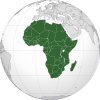User:Humptydumptythehumpback/sandbox
Crime in Cote d'Ivoire
[edit]Crime in Cote d'Ivoire is prevalent and versatile across the West African country. The most common forms of crime include human trafficking, arms trafficking, non-renewable resource crime and human rights abuse and criminal networks. Other less common, but still evident sources of crime in Cote d'Ivoire include cannabis and synthetic drug trade, fauna crimes and flora crimes[1](add other references).
The European Union funded Enhancing Africa’s Response to Transnational Organised Crime (ENACT) programme created a ten-point index score based on national criminality and resilience to crime[1]. Cote d'Ivoire has the fourth highest Criminality Score (6.23) in Africa and the second highest Criminality Score in West Africa, after Nigeria (7.70). Cote d'Ivoire is part of the 37% of countries in Africa that have a high criminal and a low resilience index score to criminality along with Egypt, Tanzania, Sudan and the Dominican Republic of Congo[1].
The high prevalence of organised crime within the state with embedded actors and political corruption prevent progress in reducing crime rates in Cote d'Ivoire.
Trafficking
[edit]Human Trafficking
[edit]Arms Trafficking
[edit]Cote d'Ivoire is a common cross border trafficking hub for smuggling legal and illegal small arms between countries[2]. Major routes for arms trafficking occur at two triborders. The first arises between Burkina Faso, Cote d'Ivoire and Mali, while the other involves the borders of Ghana, Burkina Faso and Cote d'Ivoire[2][3]. Weapons seized in various countries including Burkina Faso, northern Nigeria and central Mali can be traced back to stocks originating from Cote d'Ivoire[3]. Other routes for arms trafficking occur between Cote d'Ivoire and Liberia[3].
Major actors in small arms trafficking include low level transporters, members from regional and capital trafficking hubs and government forces[3]. Low level transporters do not usually belong larger trafficking groups. They often travel unarmed on motorbikes through unmanned and uncontrolled border crossings carrying small amounts of illegal arms[3]. Organised trafficking rings involving members from capital and regional trafficking hubs control the lower level transporters and inform about routes the transporters should take when moving goods from one location to another[3]. Government forces in Cote d'Ivoire have the ability to rent and divert military grade weapons, such as AK-pattern assault rifles, to outlawed and illegitimate users[3]. Other actors involved in the illicit transport of small arms include criminals, tribal networks and corrupt political officials[2].
High profile individuals and groups such as terrorist groups and criminals have the ability to move illegal arms across national borders for their personal use[3]. The terrorist organisation al-Murabitun trafficked licit assault rifles through Burkina Faso and Mali into Cote d'Ivoire to be used in the 2016 shootings in Grand-Bassam, Cote d'Ivoire[3]. Kidnapping for ransom and extortion escalates the power held by criminals and terrorists to traffic illicit arms [3].
In 2007, an estimated legal and illegal 400,000 guns were owned by civilians. While in 2017, the estimated total number had increased in 1,049,000[4]. Licit and illicit import of small firearms grosses Cote d'Ivoire an annual $76,182,943[4].
Drug Trafficking
[edit]Rape
[edit]Gangs
[edit]Flora Crimes
[edit]Human Rights Abuse
[edit]Non-Renewable Resource Crime
[edit]The Toxic Dumping
[edit]Murder
[edit]2016 Grand-Bassam Shootings
[edit]- ^ a b c Enhancing Africa’s Response to Transnational Organised Crime (2019). Organised Crime Index Africa 2019. [ebook] European Union. Available at: https://globalinitiative.net/wp-content/uploads/2019/09/enact_report.pdf [Accessed 29 Jan. 2020].
- ^ a b c "Small Arms Survey - New case studies reveal intricacies of arms trafficking routes and actors in West Africa and the Sahel". www.smallarmssurvey.org. Retrieved 2020-02-03.
{{cite web}}: no-break space character in|title=at position 20 (help) - ^ a b c d e f g h i j Mangan, F. and Nowak, M. (2019). The West Africa–Sahel Connection Mapping Cross-border Arms Trafficking. [ebook] Geneva. Available at: http://www.smallarmssurvey.org/fileadmin/docs/T-Briefing-Papers/SAS-BP-West-Africa-Sahel-Connection.pdf [Accessed 5 Feb. 2020].
- ^ a b "Guns in Côte d'Ivoire — Firearms, gun law and gun control". www.gunpolicy.org. Retrieved 2020-02-05.



